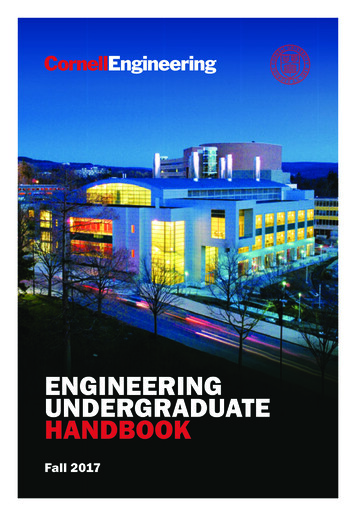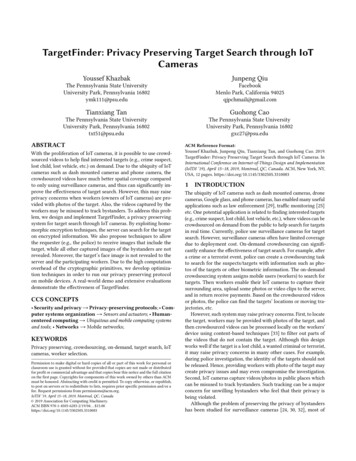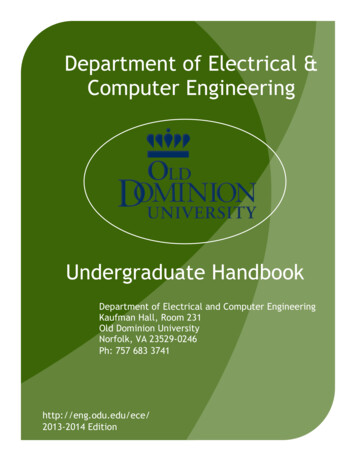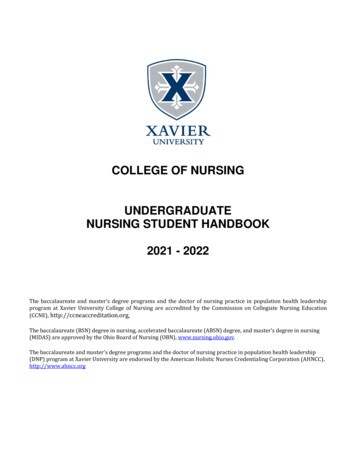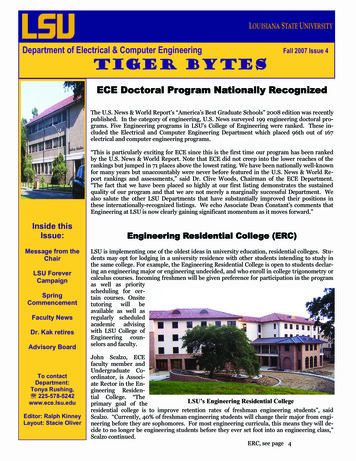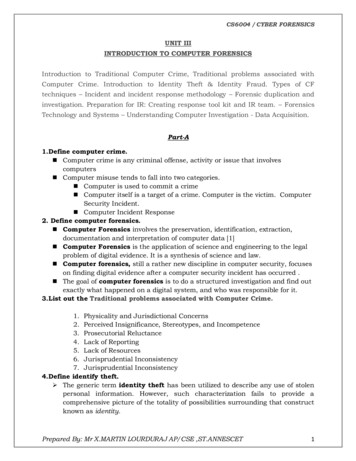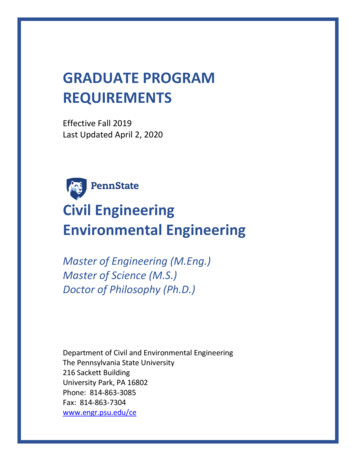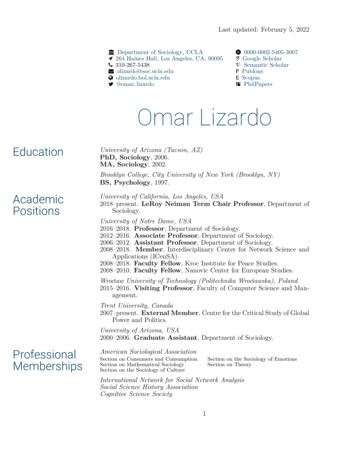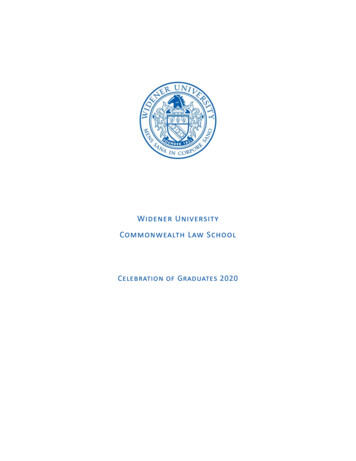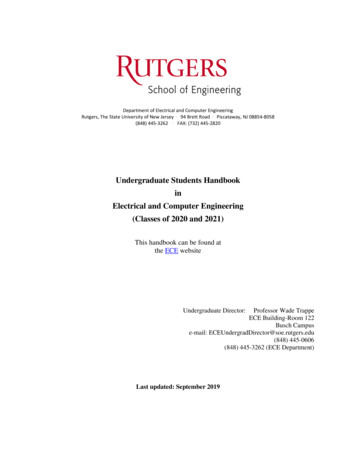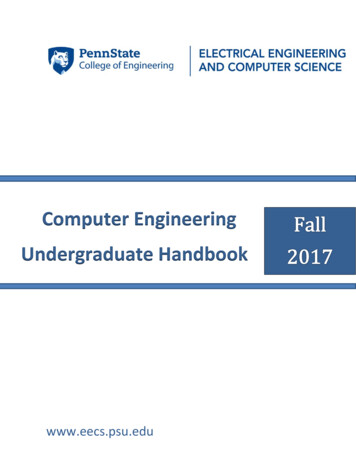
Transcription
Computer EngineeringUndergraduate Handbookwww.eecs.psu.edu
TABLE OF CONTENTSSources of Information. 1The Computer Engineering Major . 2Program Objectives . 3Student Outcomes . 3Advising and Procedures for Major . 5-Entrance to the Major . 5-Enrollment Controls . 5-Degree Audits . 6-Change of Major . 6-Concurrent Major. 6-Registration . 6-Prerequisite Courses . 6-Schedule Changes . 6-General Education. 6-Writing Requirement. 7-US & International Cultures Requirement . 7-Graduation Requirements . 7-Credit Acquisition . 7-Cooperative Education Program . 8-Honors Program . 8-Minors . 8-Other Issues . 8-Waivers and Exceptions . 8-Academic Integrity . 8-Engineering Design Experience . 9-Engineering Topics. 9-Program Requirement Summary Chart . 10Sample Schedule of Courses by Semester . 11Graduation Requirement Notes . 13-Computer Science and Engineering . 13-Computer Engineering Electives . 14
-Writing Intensive Course . 15-Electrical Engineering. 15-Communications. 15-Quantification and Statistics . 15-Health Sciences and Physical Education . 15-Natural Sciences . 16-Arts, Humanities, Social and Behavioral Sciences, US & International Cultures . 16-Department List . 16-First Year Seminar . 18
Helpful University Park Offices and Phone NumbersCollege of Engineering:Dean’s Office, 101 Hammond Building865-7537Associate Dean for Academic Programs, 101 Hammond Building863-3750Global Engineering Education, 205 Hammond Building863-9899Engineering Advising Center, 208 Hammond Building863-1033Assistant Dean for Student Services, 208G Hammond Building865-7539Multicultural Engineering Program, 208 Hammond Building865-7138Women in Engineering Program, 208 Hammond Building863-1080Engineering Career Resources and Employer Relations, 205 Hammond Building863-1032Outreach for Adult Learners, 128 Outreach Building863-2504Career Services, 101 MBNA Career Services Center865-2377Information Technology Services (ITS) Help Desk, 204 Wagner Building865-4357Counseling and Psychological Services (CAPS), 501 Student Health Center863-0395Student Disability Resources, 116 Boucke Building863-1807Penn State World Campus, 128 Outreach Building865-5403Division of Undergraduate Studies (DUS), 101 Grange Building865-7576Penn State Learning, 220 Boucke Building865-1841Office of Student Aid, 314 Shields Building865-6301Residence Life, 201 Johnston Commons863-1710Undergraduate Admissions (for transferring credits), 201 Shields Building865-5471Schreyer Honors College, 10 Schreyer Honors College (Atherton Hall)863-2635Office of Veterans Programs, 325 Boucke Building863-0465
General Information, HUB Desk, First Floor Lobby865-2000
Sources of InformationThis Handbook provides program information specifically for the undergraduate computer engineeringmajor. It should be used as a supplement to the College of Engineering Undergraduate Programs Guidethat is available online. The information in this Handbook pertains to students who entered or will beentering the major in Summer 2017, Fall 2017, or Spring 2018 semesters (2017 program year). Studentsentering the major in an earlier year should refer to the appropriate earlier version of the Handbook.Students in pre-major (ENGR) status may use this Handbook as a reference for scheduling; however, yourofficial degree requirements will be established when you enter the major. For information about thecomputer science degree, refer to the Computer Science Undergraduate Handbook. For information aboutthe data sciences (computational option) degree, refer to the Data Sciences Computational OptionUndergraduate Handbook. All of these documents are available in the department office, W306 WestgateBuilding and online at Minors-Certificates.aspx. (If youare at a campus other than University Park, you should contact the College of Engineering representativeat your location).Although this Handbook lists all requirements for the computer engineering major, only those specific tocomputer engineering are described in detail. Other general College and University requirements arediscussed only briefly with references to more comprehensive supporting documents. Many are availableon-line. A list of useful web resources is provided below. For easy reference, resource names are printed inbold throughout the Handbook.Registrar’s Schedule of Courses – https://public.lionpath.psu.edu/Undergraduate Advising Handbook – http://handbook.psu.eduAcademic Advising Portal – http://advising.psu.eduSchool of EECS – http://eecs.psu.eduPenn State University – http://www.psu.eduEngineering Advising Center – http://www.engr.psu.edu/Advising/Bulletin of Baccalaureate Degree Programs – http://bulletins.psu.edu/undergradUniversity Faculty Senate Policies and Rules for Undergraduate Students –http://www.senate.psu.edu/policies/Student Guide to General University Policies and Rules ciesRules.docxGeneral Education and US & International Cultures in the Curriculum tion/LionPath – http://launch.lionpath.psu.eduAssociation of Women in Computing - http://www.awc.cse.psu.eduAssociation for Computing Machinery Student Chapter – http://acm.psu.eduFor additional information, you can contact the Engineering Advising Center (208 Hammond, 863-1033),the Assistant Dean for Student Services (208 Hammond, 865-7539), or the Department of ComputerSummer 2016CMPEN – Page 1
Science and Engineering (W306 Westgate Building, 865-9505). The structure in the Department ofComputer Science and Engineering includes an Undergraduate Program Coordinator, an UndergraduateAdviser and an Undergraduate Staff Assistant, all of whom can provide information and guidance duringyour academic. If you communicate via e-mail, always use your Penn State account, not anotheraccount such as Gmail.The Computer Engineering MajorThe Department of Computer Science and Engineering was created in 1993 with the merger of theComputer Engineering Program and the Computer Science Department. The department offers B.S.degrees in both computer engineering (CMPEN) and computer science (CMPSC) through the College ofEngineering. It also offers the Computational Option of the inter-college Data Sciences B.S. degree.Computer engineering is the discipline concerned with connecting abstract computation to its physicalembodiments, and it focuses on the study of four primary areas. The first area includes the design,analysis, and implementation of physically realized systems that perform computational tasks, including theprocessing, storage, and communication of data. The second area includes the formulation of interfacesand the study of interactions between the hardware portions of these systems and the software running on,communicating with, or managing communications among them, as well as the co-development of softwaresystems alongside their hardware platforms. The third area includes the infrastructure required to design,build, and verify such systems. The fourth area includes the theoretical foundations underpinning theintended and achievable functionality, costs, and performance of both the hardware and softwarecomponents of these systems and their associated engineering tradeoffs.Computer engineers provide society with the myriad engines that have powered the information age fromthe smallest sensor motes to the fastest supercomputers and largest data centers, and with the tools andexpertise to use the current generation of computers to design the next. With the ubiquitous integration ofmobile communications and computational elements in everything from appliances to cars to clothing to theelectrical grid, computer engineers are responsible for developing systems and devices that havetransformed the capabilities of both individuals and entire economies.The mission of the undergraduate program in Computer Engineering is to provide our students with theskills and experience necessary to engage in further study at the graduate level or to pursue any of a broadrange of careers as platform integrators, hardware architects, systems programmers, embedded systemsdesigners, network architects, and other positions relating to the design and analysis of computational andother digital hardware and hardware/software systems. The program covers, in both breadth and depth, therepresentation, communication, and manipulation of information utilizing finite, physical resources from bothhardware and software perspectives. It includes coverage of both the fundamental science and the abstractconcepts necessary to understand and evaluate the engineering tradeoffs among key performance andcost metrics in the design of hardware and hardware/software systems, including decisions relating to bothpartitioning and co-design of solutions spanning both hardware and software. The program is structured toensure that graduates have a clear understanding of the design and the applications of current andhistorical computer systems and prepares them to be leaders in the rapidly changing field of computingthroughout their careers.Because of the close relationship to computer engineering, concurrent majors in computerengineering and computer science or computer engineering and data science are not permitted.Summer 2017CMPEN – Page 2
Program ObjectivesThe program is structured to ensure that graduates have a clear understanding of the design and theapplications of computers, as well as the ability to apply this knowledge throughout their professionalcareers.Within a few years after graduation, graduates in computer engineering should be able to:1. Work in industry or government producing or evaluating components of computer hardware and/orsoftware systems.2. Work in teams to design, implement, and/or maintain components of computer hardware and/orsoftware systems.3. Stay current through professional conferences, certificate programs, post-baccalaureate degreeprograms, or other professional educational activities.During the first two years, students in computer engineering take many courses in common with otherengineering majors, including courses in mathematics, physics, and chemistry. In addition, students takeseveral specialized courses in the major, such as algorithms and programming, electrical engineering,digital systems and logic, and computational theory. From these courses, students gain experience usingsophisticated software tools, working in a hardware laboratory, and completing individual and groupprojects. During the second two years, students complete a series of courses in both hardware andsoftware systems. Students also select from numerous electives. Throughout the four years, studentsdevelop communication skills, including a senior year course in which students examine the completedesign process and participate in a series of oral and written experiences similar to those that would beseen in industry.Student OutcomesThe following Student Outcomes summarize the skills acquired through the computer engineering program:1. An ability to apply knowledge of mathematics, science, and engineering.Analyze circuits, devices, and systems using differential and integral calculus and principles ofelectricity, magnetism, and physics.Analyze linear systems using continuous and discrete-time techniques.Analyze the time complexity of algorithms using discrete mathematics.2. An ability to design and conduct experiments, as well as to analyze and interpret data.Test circuits, devices, and systems using software, hardware and statistical tools.Test algorithms or computer code and analyze their correctness and efficiency.Design test cases for testing hardware or software.3. An ability to design a system, component, or process to meet desired needs.Design the electronic/logic circuits that form the basic building blocks of a computer system.Design the architecture and organization of the basic components of a computer system.Develop a modest (on the order of a thousand lines of code) software application, usingappropriate data structures and algorithms.4. An ability to function on multi-disciplinary teams.Demonstrate an ability to work effectively in multi-disciplinary teams. The term multidisciplinary is used here in the broader sense to include teams of computer professionalSummer 2017CMPEN – Page 3
5.6.7.8.9.10.11.having different skills; e.g., one team member might be familiar with web development,whereas another might have experience with microprocessor systems.An ability to identify, formulate, and solve engineering problems.Given specifications, design and implement a computer and/or digital system (defined as anydigital device used for computation or control) under time and budget constraint.An understanding of professional and ethical responsibility.Be able to identify ethical issues in engineering case studies.An ability to communicate effectively.Write clear and effective technical prose.Speak clearly and persuasively about technical subjects in large and/or small group settings,and use supporting materials effectively.The broad education necessary to understand the impact of engineering solutions in a global andsocietal context.Be able to discuss major trends in industry and current research activities within the discipline.A recognition of the need for, and an ability to engage in life-long learning.Demonstrate independent learning by using unfamiliar computer systems, test equipment, andsoftware tools to solve technical problems.A knowledge of contemporary issues.Be able to discuss major trends in industry and current research activities within the discipline.An ability to use the techniques, skills, and modern engineering tools necessary for engineeringpractice.Analyze the performance of software and/or hardware systems using probabilistic andstatistical methods.Design and simulate computer hardware components using standard tools.Students who are interested in math and science and enjoy solving problems are excellent candidates forthe computer engineering major. CMPEN 270 and CMPSC 121 are excellent introductions to this major.Job opportunities are virtually limitless; graduates are employed by all sectors of industry, government, andacademic institutions.*Computer engineering is accredited by the Engineering Accreditation Commission of ABET, Inc., 111Market Place, Suite 1050, Baltimore, MD 21202-4012, telephone: 410-347-7700 or http://www.abet.org.Summer 2017CMPEN – Page 4
Advising and Procedures for MajorIf you are a first- or second-year student at University Park who is intending to major in computerengineering, you will see an adviser at the Engineering Advising Center (EAC), 208 Hammond Building,863-1033. This office is open Monday through Friday, 8:00 a.m. to 5:00 p.m. (Walk-in advising is availablebut appointments are encouraged).If you are a junior or senior who has been admitted into the computer engineering major you can meet withDr. Mark Mahon, the Department of Computer Science and Engineering Undergraduate Adviser (W308Westgate Building, 867-5396). The email address, advising@cse.psu.edu will send email to him. SchreyerScholars will be assigned a Scholar’s Adviser. If you communicate via e-mail, always use your PennState account, not another account such as Gmail.Required courses for the computer engineering major and a suggested schedule are given on the followingpages. Information about all majors at Penn State are listed in the Bulletin of Baccalaureate DegreePrograms. The Bulletin is updated yearly and should be used along with this Handbook. Clarifications tothe Bulletin are noted here.The final responsibility for selecting courses and meeting degree requirements is yours. The role of youradviser is to suggest, recommend, and remind you of the requirements of the major and rules of theUniversity. (Two helpful references for University procedures on-line are: University Faculty SenatePolicies for Students and the Student Guide to General University Policies and Rules). When meetingwith your adviser, always take a copy of your recent audits, transcript, your present schedule, and your planfor at least the next semester’s courses.Because computer engineering is such a rapidly changing field, adjustments in course content and/orcourse offerings should be expected. It will be to your advantage to keep abreast of new course offerings,current course enhancements, and allowable course substitutions through regular contact with your adviserand the department office.Entrance to the major (ETM) -- To qualify for the computer engineering major:(1) You must complete MATH 140, MATH 141, MATH 250/251, CHEM 110, PHYS 211, and PHYS212 with a grade of C or better in each and have at least a 2.6 cumulative GPA in order to beadmitted to the computer engineering program. You may request admission to the major viaLionPath as soon as you have completed 40 credits of Penn State coursework and before youcomplete 59 credits of Penn State coursework.(2) You should complete at least two full semesters of coursework appropriate to the major and be indegree status. It is advisable to be taking CMPEN 270 or (CMPEN 271 and CMPEN 275), and EE210 during your second year in order to make normal progress. Be sure you’re accumulatingcredits at a minimum rate of 30 credits per calendar year.Enrollment Controls – Due to over enrollment, the computer engineering and computer science majorsare controlled majors. This means for entrance to the major you must successfully complete the requiredETM courses AND you must have the needed minimum cumulative GPA of 2.6 when you are in the ETMcredit window (40-59 cumulative Penn State credits). Because of this the CSE Department will not approverequests for transfers from other Colleges and Universities, requests for Change of Major, after a studentSummer 2017CMPEN – Page 5
has been admitted to a major, requests for computer engineering or science as a second (or later)concurrent major, nor for either major as a sequential major.Degree Audits – You are responsible for periodically checking your Degree Audit on LionPath to verify thatthe courses you have taken and plan to take will satisfy your degree requirements and that you are on trackto complete your degree when you expect to complete it. You are encouraged to meet with an advisor toreview your degree audit to verify this information.Change of Major – If you discover an interest in other areas of study or you are not admitted into computerengineering, you should explore other possible majors and alternatives at the Engineering AdvisingCenter or online at the Academic Advising Portal.Concurrent Major – Concurrent majors will not be allowed in computer science and computer engineeringor computer engineering and data sciences, although it is possible to obtain a concurrent major withanother non-enrollment controlled program.Registration – When it is time to register for the next semester’s courses, refer to this handbook andconsult with your adviser to determine an appropriate set of courses. Then go to LionPath and use itsSchedule Builder to construct your schedule. You should register as early as possible – courses fill upquickly!Re-ordering your course schedule from the “sample schedule” will not necessarily delay graduation. Thekey to completing 128 credits over 4 years is to average approximately 16-17 credits per semester. Thoughmany students do maintain this pace, it is not unusual for students to take lighter loads some semestersand to delay graduation. Experience has shown that the 5th semester has been difficult for many students; ifyou have doubts, it is a good place for a light load. Needed credits may be able to be taken during thesummer (not necessarily at University Park). Some students will elect to attend for a 9th semester. While allrequired CMPEN and CMPSC courses are offered both fall and spring semesters, most electives areoffered at most once per year. EE 353 is only offered in the spring. Take these restrictions into accountwhen you schedule. This is especially true for co-op students.Prerequisite Courses – If a CMPEN or CMPSC course has a prerequisite course(s) specified you mustcomplete the prerequisite course with an appropriate grade before taking the successor course. For mostcourses an appropriate grade is a grade of D or higher. However, if the prerequisite course is a “C orhigher” course, the appropriate grade is a C or higher. Waiving of prerequisites is not normallyapproved and can only be done by the course instructor.Schedule Changes – Schedule adjustments (course adds/drops) may be made online using LionPathduring the first 5 calendar days of each semester. Detailed instructions, costs, and deadlines are providedin the university’s Undergraduate Advising Handbook. After this time, you may still adjust your schedule,but any change is considered a late add or a late drop. REMEMBER: A student who has not yet beenadmitted to the major should seek advice at the Engineering Advising Center; a student who has beenadmitted should see the Department Undergraduate Adviser. Excessive dropping of courses may affectyour eligibility for federal financial aid.General Education – All baccalaureate students at the University are required to complete 46 credits ofGeneral Education. A General Education course can be identified by its course suffix. You will partiallySummer 2017CMPEN – Page 6
meet these requirements by taking specific courses required for the computer engineering major, and byfollowing the general guidelines below.General Education consists of the following categories:first year seminar - at least 1 credit - courses with the designation PSU will fulfill thisrequirement, as will courses with the suffix S, T or X (see NOTE below).writing/speaking - 9 credits - course suffix of GWSquantification - 6 credits - suffix of GQhealth and physical activity - 3 credits - suffix GHAnatural sciences - 9 credits - suffix GNarts - 6 credits - suffix GAhumanities - 6 credits - suffix GHsocial and behavioral sciences - 6 credits - suffix GSNote: Some campuses do not have a first year seminar requirement, but instead require participation in afirst year experience. If you started at such a campus you will need to take 1 additional credit of departmentlist course work.College of Engineering students follow the University’s General Education guidelines; refer to the Collegeof Engineering Undergraduate Programs Guide and to the University’s Baccalaureate Degree ProgramsBulletin for a complete list of available courses.Writing Requirement – All Penn State students have a Writing Across the Curriculum graduationrequirement. You must complete at least 3 credits of writing-intensive courses selected from “W” coursesoffered within the major or college of enrollment. The course in the computer engineering major that fulfillsthis requirement is CMPEN 482W (Computer Engineering Project Design).US & International Cultures Requirement – Courses approved to fulfill this requirement will bedesignated as US, IL, or both US and IL. Students must complete 3 credits in United States Cultures (US)and 3 credits in International Cultures (IL). If a student takes a 3-credit course that is both US and IL, tocomplete the requirement, he/she must take another 3-credit course that is US, IL, or both US and IL.Education abroad courses and other credit-bearing experiences such as internships that meet thisrequirement will be designated as US, IL, or both US and IL. Most students complete this requirement byselecting GA, GS or GH courses which also satisfy the US/IL requirement.Graduation Requirements – To graduate from the University, every student must:(1) Complete the course requirements for his or her major;(2) Earn at least a 2.0 cumulative grade-point average for all courses taken at the University; and(3) Earn at least a C in each of these courses: CMPSC 121, CMPSC 122, CMPSC 221, CMPSC 360,CMPEN 270 or CMPEN 271 and CMPEN 275, CMPSC 311, CMPEN 331, CMPEN 431, CMPSC465, CHEM 110, EE 210, EE 310, EE 353, MATH 140, MATH 141, MATH 250/251, PHYS 211,PHYS 212.Credit Acquisition – In addition to taking courses at any Penn State campus, you may be able to earncredit through World Campus or by transferring credits from another school. Before taking a course atanother university, check with the Admissions office and your adviser to be sure the course will transferSummer 2017CMPEN – Page 7
usefully. Note that CMPSC 473, CMPEN 431, CMPSC 465 and CMPEN 482W must be taken at PennState.Cooperative Education Program – The cooperative education program provides work experience byalternating periods of academic study and full-time employment in industry or government. The programtypically starts at the beginning of the junior year and consists of three rotations, providing a cumulativework experience of one year.If you have interest in the co-op program, you should obtain advising no later than your fourth semesterfrom the designated co-op adviser, who will help you plan work and study schedules. You may earn up to 3credits toward graduation in the Department List requirements.If you prefer less of a time commitment, you can pursue one or more summer internships. You may earn 1credit per internship (maximum of 2 credits total) toward graduation in the Department List requirements.If you are not a formal co-op or
College of Engineering: Dean's Office, 101 Hammond Building 865-7537 Associate Dean for Academic Programs, 101 Hammond Building 863-3750 Global Engineering Education, 205 Hammond Building 863-9899 Engineering Advising Center, 208 Hammond Building 863-1033 Assistant Dean for Student Services, 208G Hammond Building 865
